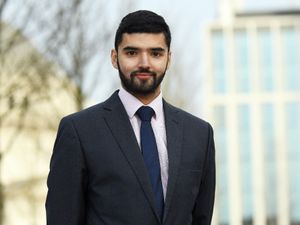First disabled astronaut says his selection sends ‘powerful message’
John McFall will travel to Germany later this week to begin feasibility studies at the European Astronaut Centre.
The selection of a British Paralympian to become the world’s first disabled astronaut delivers a “very powerful” message about what people with physical disabilities can do, he has said.
John McFall will travel to Germany later this week to begin feasibility studies at the European Astronaut Centre.
The former NHS surgeon joined the latest European Space Agency (ESA) astronaut cohort last year after a rigorous selection process and record UK Space Agency investment into the ESA.
He told the PA news agency: “I’m excited about learning and I’m excited about exploring all the science around what we’re going to do.
“So not just the science for trying to solve the problems that we’re going to face, but the science of actually learning about what it takes to become an astronaut.”
Mr McFall added: “The spillover effects of this are huge. And yes, I think it does deliver a very powerful message to humanity and educates people and broadens people’s understanding and appreciation of what people with physical disabilities can do.
“But also it will inspire people, with and without disabilities, about what they are capable of doing as well.
“This is a teeny, teeny, tiny first step in a much bigger journey. If you think 100, 200, 250 years from now, if we’re going to be a multiplanetary species, and we’re going to be regularly going to space, and people with physical disabilities are going to want to go too.
“So this is the very first step and a very small piece in a much bigger puzzle, and the first stepping stone of getting us into a position where we can understand more about getting more people to space and making space more accessible.”
Mr McFall will spend the next two years working with experts to identify how traditional equipment and facilities for astronaut life could be made more accessible and allow for a wider range of people to qualify for human spaceflight.
As part of the Fly! Feasibility Study, the 42-year-old father-of-three will undergo elements of astronaut training, such as sea survival and testing in hypobaric (low atmospheric pressure) environments.
Among other things, the tests will help the ESA to assess the impact that being an amputee and wearing a prosthesis will have on the requirements for living and working in space, and test possible solutions to any problems.
Mr McFall lost his right leg in a motorcycle accident when he was 19 but went on to become a professional track and field athlete.
Born in Frimley, Surrey, he represented Great Britain and Northern Ireland in the Paralympics – winning a bronze medal at the Beijing Paralympic Games in 2008.
It is not yet known whether or not Mr McFall will actually fly on a mission into space, and a decision on this is likely to be made in a couple of years after the feasibility study has concluded.
Dr Paul Bate, chief executive at the UK Space Agency, said: “We are thrilled to be supporting John’s journey as he takes on training and feasibility studies with ESA colleagues.
“John’s selection as the first ever astronaut with a physical disability is a landmark moment for the global space sector. It will help us discover new and more inclusive ways of working, demonstrating first-hand that space offers opportunities for everyone.
“We wish him all the best over the next two years and look forward to working closely with him.”





